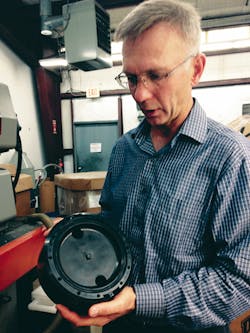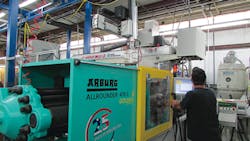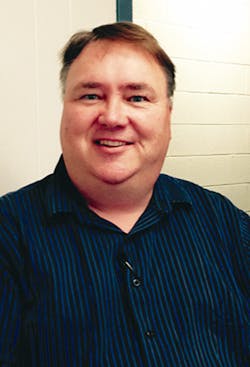CY Plastics grows from acquisitions, standardization
CY Plastics, a custom injection and blow molder in Honeoye, N.Y., is on a quest to standardize and automate its processes. Under a disciplined plan being executed by President Andy Molodetz, the company's sole owner, CY has been making targeted investments to remain competitive and thrive.
CY Plastics was founded by Charles Yacuzzo in 1978 as CY Tool Co. The company's origins remain relevant because CY still has in-house services that include tool designers and tool makers. This includes manufacturing prototypes and production molds. In 2006, Molodetz bought the company from Yacuzzo. Molodetz had no background in plastics, but he is a native of western New York and graduate of Syracuse University. He is committed to the geographic region as are the employees of CY.
The company grew into injection molding in 1980 and then into blow molding in 2002. Molodetz now has it on a growth trajectory, having won back contracts from China and having gained other work regionally. He and the company's new director of manufacturing report that the biggest challenge is managing the growth.
"We've added a pretty good amount of customers and new orders. Growth is one of our challenges," says Michael Czora, director of manufacturing.
CY employs 60; when Molodetz acquired it, it employed 13. Since 2006, CY has made two acquisitions.
"The benefit of those acquisitions is that it got us connected to another customer," Molodetz says. The company's current customers include Tyco International, Konica Minolta, IDEX, Welch Allyn, Electrochem and Bausch + Lomb. It occupies a 38,000-square-foot facility.
During Plastics Machinery Magazine's visit in October, Molodetz discussed his plans and how the company is achieving its goals through targeted equipment purchases, which are detailed later in this article.
"You need to make sure that you've taken steps so that you're immune to the world," he says. That includes making choices about robotics when there is talk of minimum wages increasing. "Automation brings consistency, but there also is the wage part of it."
Molodetz has made many changes since buying the company. There is no voice mail, for example. Those calling the company talk to a person; if the person they want to reach is not available, the receptionist takes a message.
"Our competitive advantage is that we're easy to do business with," says Molodetz. "We do not have voice mail. We could. But I am just not going to turn it on. We do it the old-fashioned way."
Other changes include strategic moves within the management team.
"I took the management team that was here, lock, stock and barrel," he says. "We've had changeover. As the company increased sophistication in technology, the management team had to increase in sophistication with it."
One of the more recent additions is Czora, who was hired in June. Czora has more than 30 years of experience in manufacturing technical products, including six years as co-owner and VP of Spectracom Corp. and four years as co-owner and COO of Hydroacoustics Inc. Both are based in the Rochester, N.Y. area.
"We're trying to get more standardization," says Czora. "Once it's validated, the plastics injection molding process has to be repeatable every time. You have to have good processes to be able to do that validation."
Czora also emphasized that certain products, such as medical parts, cannot be produced in overseas markets. This is where opportunity lies for molders like CY.
Molding equipment
Standardization and the repeatability that comes with it are crucial to delivering products to CY's growing customer roster. The list includes a maker of residential water pumps.
"They are very serious about quality so when you sign up with them, you better bring your 'A' game," Molodetz says.
Early on, Molodetz purchased a lot of used equipment, but that has been changing. The company recently added a new Arburg Allrounder 470 C injection molding press. This is the third of that particular model for the plant, and the need to standardize has made CY loyal to the brand.
"We've invested in Arburgs," Molodetz says matter-of-factly. "We could have spent a lot less money on machines, but we decided to invest in machines that have the precision that we needed."
The products that require such precision include power cords for an infusion pump. On this particular product, a ferrite bead gets slipped over a cable and then is overmolded.
"We probably make 150,000 of these a year," says Molodetz. "But most molders wouldn't do this. We consider ourselves to exist so that our customers can do what they need to do. We like to understand where our plastics parts fit in what they do."
Higher-end machines allow more precise adjustments to speed, pressure and shot size, he says. This is made possible by a combination of better software, more precise measuring devices and more precision in the machine components. The higher-end machines also have more options for monitoring performance through data collection and alarms.
In terms of controls, the new Arburg press comes with the hardware and software to control the machine. The control system supplied on the machine is Selogica, which has been pretty much unchanged for at least 10 years, says Molodetz.
"This is very appealing to us as a molder because as suppliers change their electronics, getting replacement printed circuit boards becomes very expensive and upgrading to the current controller is likewise very expensive," he says. "So we prefer suppliers that know how to design a solid control platform upon which they may make software upgrades but not frequent circuit board changes."
The 165-ton press has been equipped with a three-axis programmable robot from Star Automation. The robot's end-of-arm tooling removes parts from the mold and welds them into an assembled part using a new Branson 920 ultrasonic welder. The products it will produce include filter end caps and gun components. The clamping forces of CY's presses range from 45-425 tons.
"We're not doing any commodity-type products," emphasizes Molodetz. "We'd rather help resolve an issue and get paid for it rather than make or break on a tenth of a penny."
CY's blow molding operations include an Improved B-24 blow molding machine with a hydraulic programming rod. This machine has been used to make products such as a flare container. These containers are used to keep flares dry and ready to use. The flare container mold was designed and built at CY. Its other blow molder is a Rocheleau.
Auxiliary equipment
The key to CY's machinery and equipment enhancements is what it is doing with auxiliary equipment. Among other investments, CY is adding a second new Novatec wheel dryer.
"We invested in these dryers because we wanted the latest electronics and software in the controls," says Molodetz. "As an added benefit, we have found our two new wheel dryers are drying material in two hours versus four hours for our older dryers. And when you are doing several changeovers per day, that means that you aren't having to stage material or wait for material to dry. In the end, that makes us more efficient and more cost-effective."
The company also recently purchased an RG-3 granulator from Rapid Granulator Inc. Molodetz said that the granulator is ultra-low speed and does a better job of cutting runners and small parts, rather than pulverizing them.
"High-speed granulators can be effective with some materials, but they tend to create regrind with a significant amount of dust," says Molodetz. "This new granulator significantly improves our ability to recycle runners, generating quality regrind that makes us more cost-effective and [it] minimizes what might otherwise get sent to a landfill."
Secondary operations
In its finishing and assembly operations, CY incorporates certain tasks into the molding cells. One example is ultrasonic welding. Molded parts are taken from the press and moved to the welder robotically.
In part, CY's approach to secondary operations was responsible for winning over a major new customer last year.
"They cited our strength in sonic welding and other secondary operations, and our ability to work with them on cost reductions that will allow them to reduce or eliminate sourcing from China," says Molodetz.
The company's other secondary operations include machining a finish on a PC molded part. In addition, it also performs heat staking and insertion, hot stamping, pad printing and decorating.
Angie DeRosa, managing editor
Contact:
CY Plastics, 585-229-2555, www.cyplas.com




